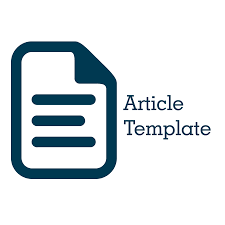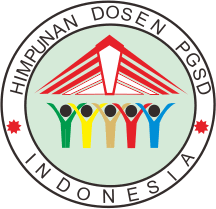Pengaruh model role playing terhadap kemampuan berpikir kreatif siswa pada mata pelakaran IPAS di kelas IV Sekolah Dasar
Abstract
The ability to think creatively is one of the abilities that needs to be improved in 21st century learning. However, in reality elementary school students' creative thinking is still low, including in Natural and Social Sciences lessons, Social Sciences sub-material. This is because the learning model used to teach social studies material is still monotonous and lecture-based. Based on this, the aim of this research is to determine the effect of role playing models on improving students' creative thinking abilities in Natural and Social Sciences subjects, Social Sciences sub-material. The type of research used in this research is a quasi-experimental model with a non-equivalent control group design, namely conducting a pretest and posttest in the experimental class and control class. The subjects in this research were 52 students of class IV elementary school consisting of 26 students of class IV A and 26 students of class IV B. The results of this research concluded that the increase in creative thinking abilities of students who received learning using the role playing model was better than that of students who receive conventional learning and there is an influence of the role playing model of 51% on students' creative thinking abilities in terms of the results of simple linear regression analysis.
Keywords
Full Text:
PDFReferences
[1]Soleah, N. D., Nurfaizah, & Khaerunnisa. (2022). Penerapan Metode Role Playing Berbasis 3 Dimensi Untuk Meningkatkan Kemampuan Berpikir Kreatif Siswa Pada Pembelajaran Pkn Kelas V Di Sd It Al- Akhyar Kota Makassar Application Of Role Play Method Based On 3 Dimensions To Increase Students ’ Creative Thin. C, 1–18.
[2] Susanto, A. (2017). Pendidikan IPS : Upaya Mengembangkan Kemampuan Berpikir Kreatif. Prosiding Diskusi Panel Pendidikan “Menjadi Guru Pembelajar,” 1(1), 23–28.
[3] Damaiyanti, R., Akbar, M. T., & Prasrihamni, M. (2023). Analisis Kemampuan Berpikir Kreatif Siswa Pada Pembelajaran IPS Kelas 4 SD. Jurnal Ilmiah PGSD FKIP Universitas Mandiri, 09(September), 339–348.
[4] Ananda, R. (2019). Penerapan Metode Mind Mapping Untuk Meningkatkan Kemampuan Berpikir Kreatif Siswa Sekolah Dasar. Edukatif : Jurnal Ilmu Pendidikan, 1(1), 1–10. https://doi.org/10.31004/edukatif.v1i1.1
[5] Yanto, A. (2015). Metode Bermain Peran (Role Playing) Untuk Meningkatkan Hasil Belajar Siswa Pada Mata Pelajaran Ips. Jurnal Cakrawala Pendas, 1(1). https://doi.org/10.31949/jcp.v1i1.345
[6] Bhattacharjee, S., & Ghosh, S. (2013). Usefulness of role-playing teaching in construction education : A systematic review. Annual International Conference Proceedings, 2001, 7.
[7] Kristin, F. (2018). Meta-Analisis Pengaruh Model Pembelajaran Role Playing Terhadap Hasil Belajar Ips. Refleksi Edukatika : Jurnal Ilmiah Kependidikan, 8(2). https://doi.org/10.24176/re.v8i2.2356
[8] Nurhasanah, I. A., Atep, S., & Ali, S. (2016). Penerapan Metode Role Playing Untuk Meningkatkan Hasil Belajar Siswa Pada Materi Hubungan Mahluk Hidup Dengan Lingkungannya. Jurnal Pena Ilmiah, 1(1), 611–620.
[9] Ningrum, D. C. (2020). Penerapan Model Bermain Peran (Role Playing) untuk Meningkatkan Hasil Belajar Siswa Kelas V SDN 2 Kotagajah Lampung Tengah. 1–168.
[10] Ningrum, D. C. (2020). Penerapan Model Bermain Peran (Role Playing) untuk Meningkatkan Hasil Belajar Siswa Kelas V SDN 2 Kotagajah Lampung Tengah. 1–168.
[11] Sugiyono. (2016). Metode Penelitian Kuantitatif, Kualitatif, Dan R&D. ALFABETA. [12] Sukmadinata, N. S. (2011). METODE PENELITIAN PENDIDIKAN. PT Remaja Rosdakarya. Bandung.
[13] Muthmainah, U. L. (2012). Pengaruh Metode Role Playing Terhadap Motivasi Dan Hasil Belajar Fiqih Peserta Didik Kelas X Mipa 4 Man 1 Trenggalek. 16–45.
[14] Maharani, N. (2019). Pengaruh Model Pembelajaran Role Playing Hasil Belajar Siswa Kelas IV Min 8 Medan Kecamatan Medan Petisah Pada Mata Pelajaran Pendidikan Kewarganegaraan (PKn) T.A 2018/2019. Angewandte Chemie International Edition, 6(11), 951–952.
[15] Uno, H. B. (2008). Model Pembelajaran. Bumi Aksara.
Refbacks
- There are currently no refbacks.


